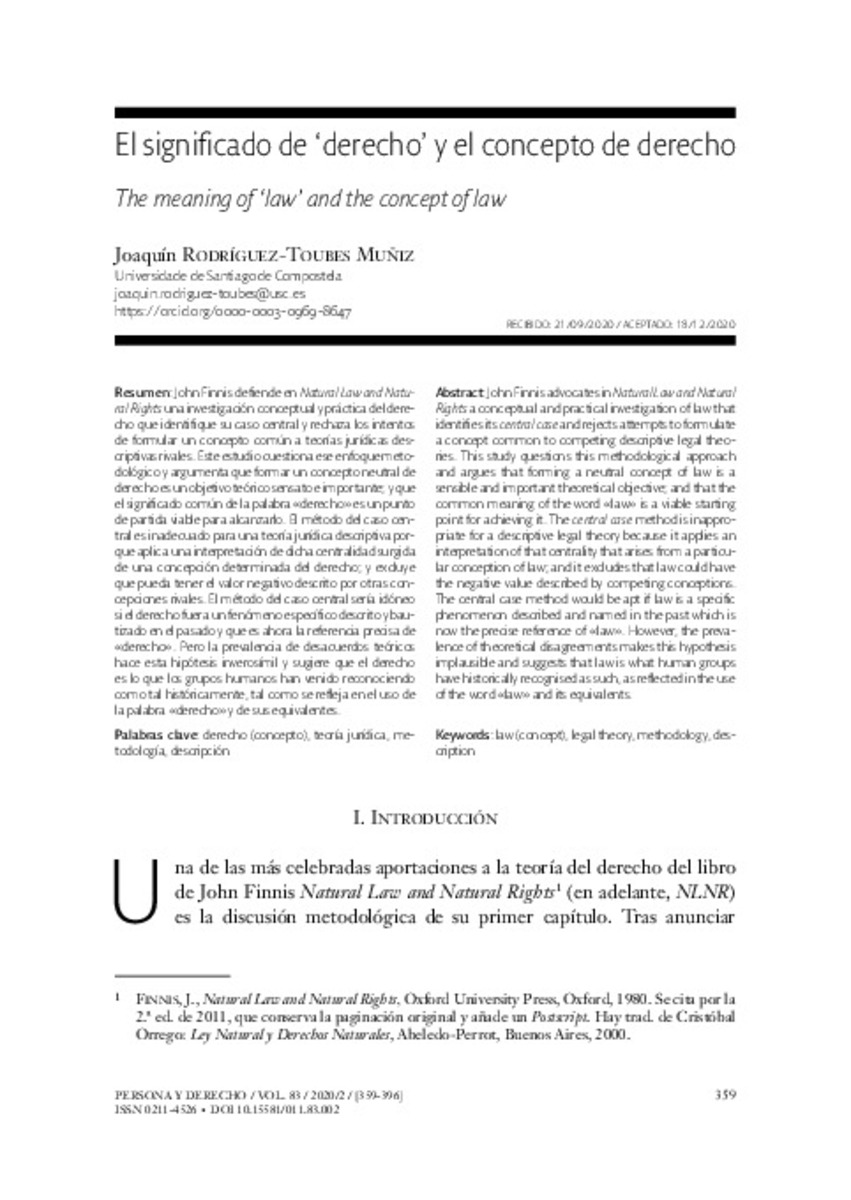Full metadata record
| DC Field | Value | Language |
|---|---|---|
| dc.creator | Rodríguez-Toubes-Muñiz, J. (Joaquín) | - |
| dc.date.accessioned | 2020-12-28 | - |
| dc.date.accessioned | 2021-08-25T09:55:43Z | - |
| dc.date.available | 2021-08-25T09:55:43Z | - |
| dc.date.issued | 2020 | - |
| dc.identifier.citation | Rodríguez-Toubes-Muñiz, J. (Joaquín). "El significado de «derecho» y el concepto de derecho". Revista Persona y Derecho. 83, 2020, 359 - 396 | es |
| dc.identifier.issn | 0211-4526 | - |
| dc.identifier.uri | https://hdl.handle.net/10171/61660 | - |
| dc.description.abstract | John Finnis advocates in <em>Natural Law and Natural Rights </em>a conceptual and practical investigation of law that identifies its <em>central case </em>and rejects attempts to formulate a concept common to competing descriptive legal theories. This study questions this methodological approach and argues that forming a neutral concept of law is a sensible and important theoretical objective; and that the common meaning of the word «law» is a viable starting point for achieving it. The <em>central case </em>method is inappropriate for a descriptive legal theory because it applies an interpretation of that centrality that arises from a particular conception of law; and it excludes that law could have the negative value described bycompeting conceptions. The central case method would be apt if law is a specific phenomenon described and named in the past which is now the precise reference of «law». However, the prevalence of theoretical disagreements makes this hypothesis implausible and suggests that law is what human groups have historically recognised as such, as reflected in the use of the word «law» and its equivalents. | en_US |
| dc.description.abstract | John Finnis defiende en <em>Natural Law and Natural Rights </em>una investigación conceptual y práctica del derecho que identifique su caso central y rechaza los intentos de formular un concepto común a teorías jurídicas descriptivas rivales. Este estudio cuestiona ese enfoque metodológico y argumenta que formar un concepto neutral de derecho es un objetivo teórico sensato e importante; y que el significado común de la palabra «derecho» es un punto de partida viable para alcanzarlo. El método del caso central es inadecuado para una teoría jurídica descriptiva porque aplica una interpretación de dicha centralidad surgida de una concepción determinada del derecho; y excluye que pueda tener el valor negativo descrito por otras concepciones rivales. El método del caso central sería idóneo si el derecho fuera un fenómeno específico descrito y bautizado en el pasado y que es ahora la referencia precisa de «derecho». Pero la prevalencia de desacuerdos teóricos hace esta hipótesis inverosímil y sugiere que el derecho es lo que los grupos humanos han venido reconociendo como tal históricamente, tal como se refleja en el uso de la palabra «derecho» y de sus equivalentes. | es_ES |
| dc.language.iso | spa | - |
| dc.publisher | Servicio de Publicaciones de la Universidad de Navarra | es_ES |
| dc.rights | info:eu-repo/semantics/openAccess | es_ES |
| dc.subject | derecho -concepto | - |
| dc.subject | teoría jurídica | - |
| dc.subject | metodología | - |
| dc.subject | descripción | - |
| dc.title | El significado de «derecho» y el concepto de derecho | es_ES |
| dc.title.alternative | The meaning of «law» and the concept of law | en_US |
| dc.type | info:eu-repo/semantics/article | es_ES |
| dc.identifier.doi | 10.15581/011.83.002 | - |
| dadun.citation.endingPage | 396 | - |
| dadun.citation.publicationName | Revista Persona y Derecho | - |
| dadun.citation.startingPage | 359 | - |
| dadun.citation.volume | 83 | - |
Files in This Item:
Statistics and impact
Items in Dadun are protected by copyright, with all rights reserved, unless otherwise indicated.






